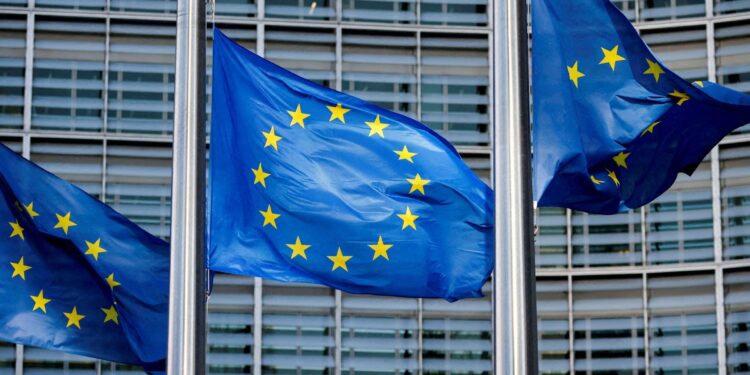The European Union has reduced its forecast for economic growth in the euro area for the year 2025, under the pressure of global trade tensions due to comprehensive customs duties imposed by US President Donald Trump.
The European Commission announced that the economy of the unified currency area, which includes 20 countries, is expected to grow by 0.9% in 2025, with a decrease from previous expectations of 1.3%, due to “weak global trade prospects and the increasing state of uncertainty about commercial policies.”
EU economics expectations
The European Union also reduced its expectations for the growth of the eurozone in 2026 to 1.4%, backing from the 1.6% that was expected in November 2024.
“It is expected that growth will continue in 2025, with the support of the strong labor market and high wages, albeit at a moderate pace.”
Trump imposed 25% customs duties on steel, aluminum and cars from the European Union and other countries, but the bloc countries are subject to additional customs duties unless they reach an agreement with Washington.
The US President announced the imposition of 20% customs duties on most of the European Union commodities in April, in addition to higher fees on dozens of other countries.
https://www.youtube.com/watch?v=cvCVEPY4DII
But Trump commented on this procedure until July to allow negotiations as he kept a 10% basic customs tariff on imports from all over the world, including from the 27 European Union countries.
The European Union announced that Germany, the largest economy in the bloc, will not achieve growth at all in 2025, a significant decrease compared to the growth expectations issued last year, of 0.7%.
“The expectations are still reassuring and tend to decline, so the European Union must take decisive measures to enhance our competitiveness,” said Dombrovscis.
After the European Commission focused during its previous period on combating climate change, it has now turned to pour its effort on competitiveness, in an effort to facilitate the work of companies in the face of fierce competition from Chinese and American companies.
Inflation
Explaining Monday’s expectations, the European Union also referred to the trade war between the United States and China, during which the two sides raised customs duties a lot before reducing them as part of a temporary calm.
The commission said: “The customs duties that China and the United States agreed on on May 12 were eventually less than expected, but it remains high enough to assume that damage to the trade relationship between the United States and China.”
In addition to commercial tensions, the European Union warned that climate -associated disasters, such as forest fires and floods would harm economic growth.
UNHCR has kept its expectations for low inflation in the unified currency area to 2.1%, which is very close to the goal of the European Central Bank of 2%.
https://www.youtube.com/watch?v=0pwthdlygc
Inflation in the 20 countries in the euro area slowed sharply from its highest levels in late 2022, settling at 2.2% in April.
The European Union reduced its forecast for the inflation rate for 2026 from 1.9% to 1.7%.
Brussels said that continued global trade tensions would restore inflationary pressure on the economy.



